As some of you know, taking hissy spitty kittens is one thing I like to think I specialize in. I've taken many sets and had fairly good success with most of them, and great success with many of them.
I've had a few people ask for help with it recently and I thought it would be beneficial to do another "What I Know" post. As a reminder, this is what *I* know, either through what I've read and/or from first-hand experience. I might not be the world's leading expert on the subject and someone else might have suggestions that work better *for you and your kittens* but this is what has worked for me.
First, you need to determine what you are dealing with. There are several types of hissy spitty kittens. There are those that are fearful because they are feral (not stray, but actual wild animals) and have the instinct to fear you and their mother taught them to trust nothing. Then there are those that are fearful because they were caught up by a great big huge being, shoved in a box, put in a car, and driven to a very loud oddly smelling building. Then they probably had more people grab them and give them injections and flea medications, etc.. so not only are they overwhelmed by it all but they haven't had a lot of positive interactions with humans.
You also need to account for personality. So-called "Alpha" cats are going to put on a tougher front but will be more willing to challenge you and thus often come around a lot quicker than your "beta" or "omega" personality kittens. (Alpha, beta, and omega are not hard and fast descriptions of personalities as you might be accustomed to them, but they are decent descriptors or what you will be facing. An alpha will challenge you. A beta will sit back and wait and see how it goes. The omega expects that everything is going to go badly for them and waits for you to engage them)
Age is also a very important factor. Kittens are designed to be pretty open to new experiences the younger they are to help them be more adaptable to accept and thrive their surroundings. They learn from their mother what is safe and what isn't. Around 7-8 + weeks a feral kitten is MUCH harder to pull out of its shell than a 3-4 week old kitten. The older the kitten, the more time that needs to be invested and the trickier you need to be.
Do not be discouraged if it takes longer than you think it should. Do not give up. The kitten may never win congeniality awards, but it can turn into a very loving companion. And besides, winning the trust of a kitty who doesn't trust easily.. it makes it all worth it. I quite often come close to tears when I see a feral kitten take that first step of trust on their own.
First thing you need to realize is there is the language of cat and what you are communicating to them in your interactions. Coming right at them, looking them in the eye and then reaching your hand out to them to pat them are ALL huge challenges to a cat and each one on their own would frighten a kitten. These could be the actions of an adult cat set to put a smackdown on a kitten but they are also actions of predators to their prey. You think you are being soft and generous, but chances are they are reading this as "I am going to kill you". Considering what their experiences with humans have probably been up to this point, all they can do is believe it.
Your job, over however long it takes, is to desensitize your kitten to these moves. Look them in the eye when you feed them, put your hand out towards them to the point where they just start to flinch and then just leave it right there.
When interacting with your kitten, try to always have yummy food. I like to make them 'work' for food. By getting something totally yummy, such as chicken breast (raw or cooked) or meat-based baby food (meat and broth only), you can often entice kittens to walk toward you. If you can't, then move the food toward them and place it under their nose and try to get them to eat. Cats won't eat in front of perceived danger, so whatever step you need to take to get them to do this will help them understand you are not a threat. For those very afraid I will often put a dab of the food on their nose so they have to lick it off. Someone who is going to eat them isn't going to feed them. (No, kittens haven't read Hansel and Gretel) If they won't lick it off while you are looking at them, turn away. Hopefully, the next time you offer food they will take it, then the next time they will come closer to you to get to it.
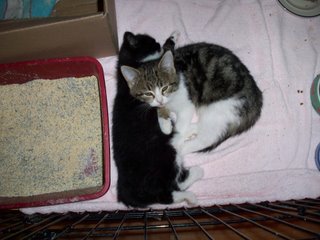 |
| Happiness and Joy 2008 |
Touching your kittens:
You can't tame a kitten you can't touch. You can't touch a kitten that has a hiding spot that you can't reach easily enough to very easily pick up. Because of this, I have a cat cage, but I have also used my bathroom. I provide hiding places but make sure they are something I can get a kitten out of pretty easily with a high degree of confidence. You want to minimize that transition as much as you possibly can, so put yourself in a position that once you have your hands on the kitten you can get them up off the ground and into your arms as quickly as possible. I make myself comfortable on the ground so that I do not have to do much before they are secure.
Another good reason to limit the space kittens have access to is the cat's sense of smell and how much comfort and security they gain from their environment smelling like them. This is why when cats are stressed they often start spraying. It is also why giving kittens run of the house is overwhelming. They want to explore and scent everything and the more there is the longer it will take. They don't know what is around so they only feel comfortable moving when it is quiet. Keeping their space small will help them spread their scent easier.
 |
| Happiness ~2008 |
I believe in "imposing myself" on kittens, but not forcing it. The second the kitten struggles to get down I put them down, but I do not let them go until all four paws are on the ground. This builds trust. If the kitten struggles hard on the way down, I return them to the security of my arms and try again when they calm down. You never want a kitten jumping out of your hands/arms and certainly no more then a simple step off of you if they are on your lap. If they think "I have to escape there is no other way" each time they are picked up it is going to take longer for them to accept being held because they will be constantly looking for an escape. If they learn that "when I ask to be put down I will be put down safely", they are more apt to sit quietly in your arms longer.
Petting your kitten while you aren't holding it will often involve trickery. Wait until their head is buried in some food or if you are lucky enough while they are asleep. Come at them from the side or from behind slowly and if you are lucky enough to have a kitten who has 'elevator butt' then go right for that spot. (you know elevator butt, don't you? When you pet at the base of their tail and they extend their legs as far as they will go so their butt goes high in the air.. ) and if not pat gently a few times and stop as soon as the kitten realizes what is going on. If they don't make to run you can try for a few more pets the next time, but the key is to end on a positive note and not one where they are running from you. This is why you freeze your hand when moving it towards them if they tense up as continuing will only make them run and the more times they run from you, the more likely they will run the next time they encounter you no matter what you are doing.
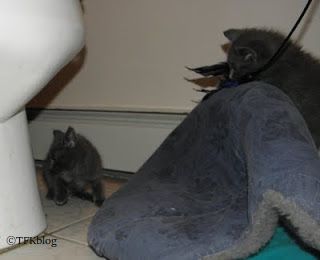 |
| Kate and Pippa 2011 |
At this point, I think it is important to discuss that the attitude you bring to the kittens matters a great deal. If being hissed at and swatted at scares you, then they are going to feel that fear and continue to do it hoping you'll leave them alone. If you are afraid of your kittens, then wear protection, do whatever you need to do in order to let them know that their hissing and swatting is not going to make you retreat. Generally, the younger kittens can't do more damage than a red mark on your hand, but older ones can bite to draw blood. Wearing gloves and long sleeves will protect you fairly well but try not to make your hands bigger (oven mitts) or more imposing. The easiest way to prevent being injured is to slow down. If they hiss at you when you sit down, don't try to reach for them until they stop hissing. If they start hissing at you when you reach in to pick them up, simply stop moving forward and wait. It might take you two minutes or ten, but go at their pace. Once you get past that fear of being hurt by them, you can be totally amused by such small beings thinking they can frighten you away.
NEVER "punish" a fearful cat for being fearful. Never yell, heck for a while don't even tell the kitten not to be afraid. They are doing what comes naturally to them and it is the right response for the situation. I will often praise kittens for being upset with me because in the wild it is what will keep them alive, but then I gently go on to tell them they aren't in the wild now and I will keep them safe, and warm and well-fed. I constantly tell kittens "I know what I'm doing" and will work with their physical reflexes to help calm them - but more on that in a bit.
You need to make sure the kittens associate you with all things awesome. When I set up kittens, they have food/water, litter, and a bed/box to hide in. That is is. That is what they get for being alive, that which they do not need to work for. Their basic needs are met, but all extras need to be earned. Canned food is offered each time I go into the room. Toys are introduced and used while I am in the room. For kittens afraid when I get near I use stick or fishing pole type toys.
Feathers and other natural fibers such as fur are almost irresistible to kittens, for kittens so frightened they can't seem to move, often sliding a feather or some fur over their paw pads will pique their interest. Being far enough away that you can't seem to be able to grab them will open them up a bit, and with the little bit you have gained another foothold into "humans are awesome".
Getting kittens running after "prey" turns them from prey themselves into the predators that they need to be to be confident. They often lose track of that fear while "on the hunt" and at this point you can often circle them around closer and closer to you. See if you can't get them running near your feet or sit on the floor and see if you can't get them running over your legs. Sometimes they will and won't notice. Sometimes they'll notice and freeze up and runoff. Just keep the play session going and try again later. If you can, get someone to help you, and have them (or you) lay on the floor (face down feels safer to me) and see if they can get the kittens running over all of you. I can quite often get kittens on my back that won't even look at me when I am sitting up or standing. Sometimes just laying there is enough.
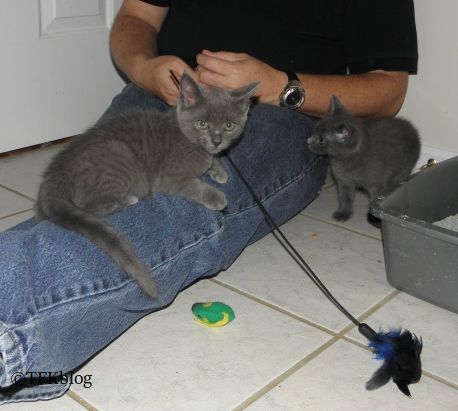 |
| Kate and Pippa explore my husband ~2011 |
I also think that the "
hand monster" is another invaluable tool to get a kitten's trust. When they reach out and smack you, it builds confidence. Remember, "play" isn't just "play" to a kitten. It is that time of their day where they work on their hunting skills, where they learn what they can do, what pounce moves work, how to wrestle, etc. This is why feathers over paw pads work. If they were still in the wild with their mother she would bring home small wounded animals for them to "play" with and work out their hunting skills, and later she would bring home not so wounded animals. Finding out if your kittens are mousers (liking toys dragged across the floor) or birders (loving to jump through the air to catch a bird) will help you tailor games to their skills and enhance their experiences with you.
For kittens that lack confidence, a friend may be a good idea. Seeing if the shelter has a kitten of similar age that is outgoing can help shy kittens accept that climbing over humans isn't going to result in immediate death. Allowing them to see another kitten having fun, purring, venturing forth might spur the interest in the shy kitten.
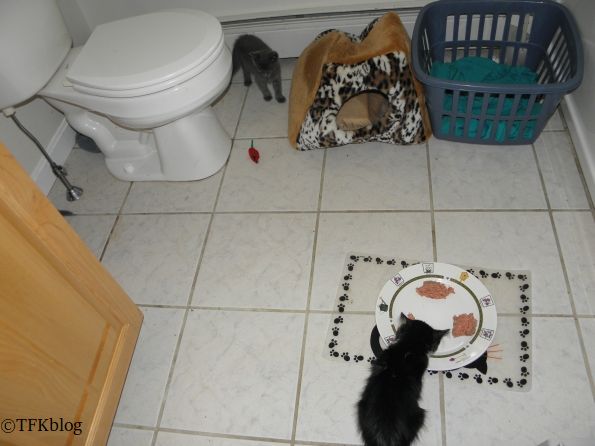 |
| Outgoing "Bug" challenges Kate and Pippa to venture forth to try the food - 2008 |
On the other hand, a very outgoing cat might dampen the true spirit of a kitten - as I am currently facing with Jackson and Lady Frida. Every time I start to engage her in play he comes along and steals the toy and she just lets him because it is easier than facing her fears. Only you can decide which course of action might help a particular kitten. Do not be afraid to make a decision. If you think it will help, it probably will. If you were wrong, there is often very little that you can't 'undo'.
Self-confidence is very very important. Right now your kitten's job in life is to survive. To that end, it should be learning to hunt and kill and feed itself. Engaging with toys to work on that "stalk, hunt, pounce" instinct to help them 'learn to kill' will help feed that self-confidence. Engaged play will help the kitten realize it can engage in the environment and survive, and then it can enjoy the process.
Having the mother cat does often seem to inhibit bonding. While in general, I believe having a mother cat with kittens is very important, sometimes you have to make the call to separate them to help enhance their desire to bond with you. If mom is hanging around offering uber delicious milk and very comforting licks they are going to be less likely to seek you out. It is a judgment call if you think the mother is doing them some good. If they are of age to be weaned, it might just be the right decision to separate them sooner rather than later.
I have also found that taking the kittens out of their 'nest' and letting them investigate new environments can help a great deal with their self-esteem.
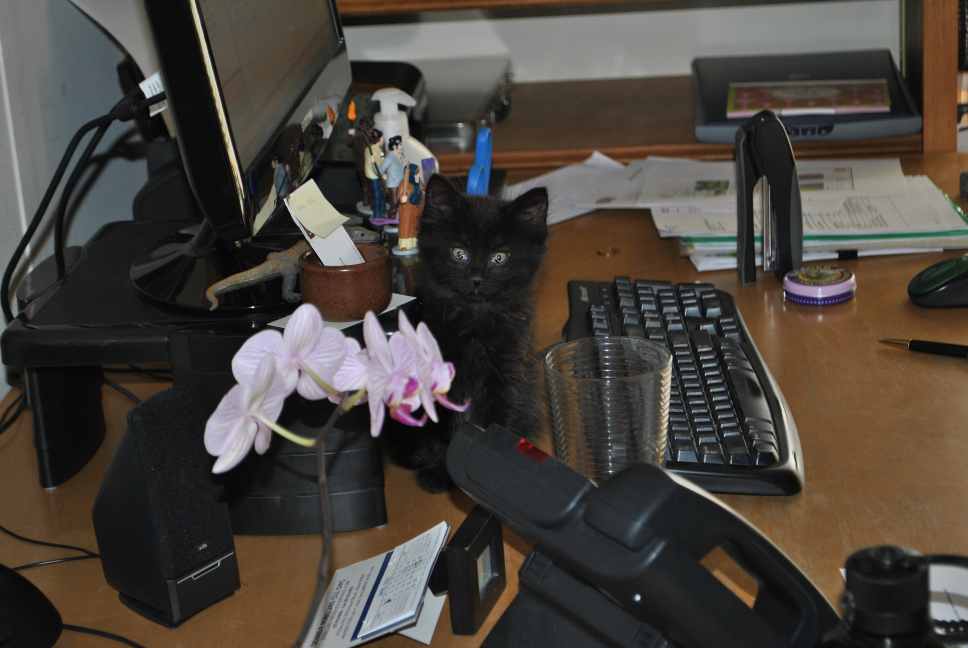 |
| Squirrel at work - 2012 |
I am very lucky that my boss is kitten friendly and my office does facilitate being able to bring kittens. Unfortunately, the owner of the company isn't as kitten friendly so when he is in the country the kittens can't come to work with me. At that time I will bring the kittens to the shelter and ask the staff to cuddle the kittens or trim their nails.. anything to get someone else's hands on them and give them an 'outing'. The more often you do this, the better for the kittens. It might seem "overly" stressful, but it really is good for them. Often their confidence is noticeably improved upon returning to the kitten room no matter how unsuccessful the trip appeared to be at the time. Sometimes just taking the kittens out of the room they are in and letting them play in a different room can help. But remember, if your kittens are dealing with any sort of illness, the stress of this type of outing very well could tax the body to the point where they become sicker. If you think they might break with something, keep the trip small (do a different room or even just a trip around the house) and see how it goes. The last thing you want is to have to medicate a feral kitten.
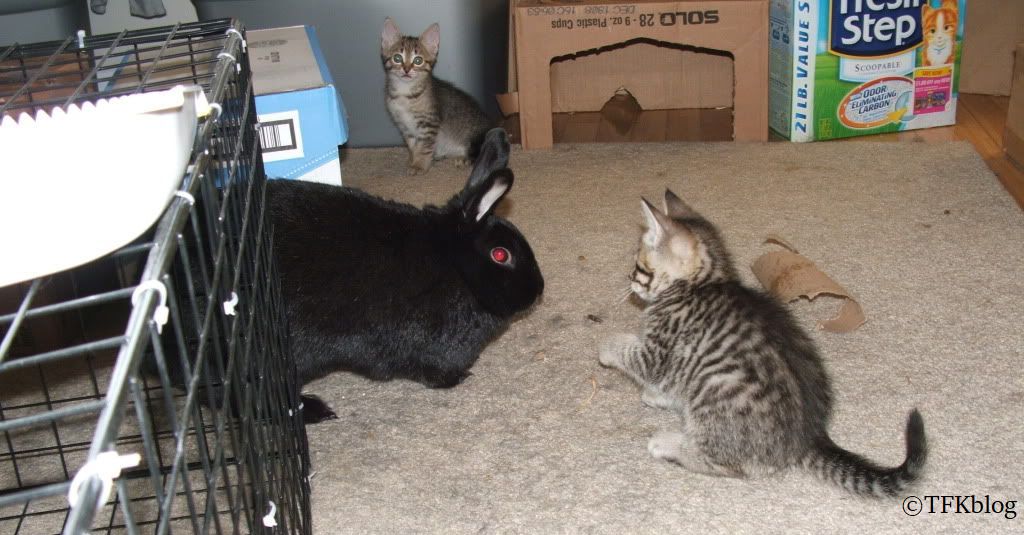 |
| a 'faked outing' bring the kittens to my rabbit ~2009 |
If need be, do not hesitate to use some "chemical" help to soothe the edges of their fear. Often kittens are so fearful they forget what they are afraid of, and simply respond to the instinct. There are a few products that can help with that. I have personal experience using a couple of them and highly recommend
Rescue Remedy by Bach's Flower Essences. It is often recommended for dogs who are afraid of thunderstorms. I've used it myself in times of stress. I've also used a few of the individual flower essences both for myself and my cats. Flower Essences are not a 'medicine' but more of an herbal, it works subtly, but cumulatively. A lot of people think they are hooey and it is simply a placebo because it is subtle or possibly because they chose an essence for a different problem than what they are hoping to help; but even if it is, I've seen it work, so I say give it a try. I've also used
Spirit Essences and really liked those as well. Now each individual responds differently because they are coming from completely different spaces. What works for one fearful cat might not work on another because what they are afraid of is different. I had Spirit Essence "Safe Space" work very well on two different sets of timid kittens. It is doing almost nothing for Frida.
Feliway is a mimic of the welcoming pheromone that cats rub on things with their chin. It does not "calm" cats like a lot of people say it does, but makes the environment less frightening by making it smell thus feel more familiar. I've seen a lot of people say it doesn't work, but they have been using it to "calm" cats, and not understanding what it is doing and what its actual purpose is for. I used it when I moved my cats in my new home, and I liked it a lot. I've used it with a few adult fosters. I know several vets who use it in the cages or carriers for cats in their care.
I have started implementing routines. When I go into the foster room I knock on the door and announce my presence - letting them run and hide if they need to. I then have a set routine for my first interactions, I pick up old bowls, refill food/water, scoop boxes, all the time telling the kittens what I am about to do next and if what I am doing is taking a while explaining what I am doing (aka - just opening this can of food for you and now I'm scooping it into the bowl) This helps kittens get used to you as you are no longer this random ball of chaos that comes in and interrupts their day but it is something they can expect and get used to.
I have also found that keeping the noise level consistent keeps kitties from regressing. I have used talk radio, classical radio, general TV, home shopping TV, among others to help the kittens get used to the sound of people. I also will do "challenge noises". If you have ever sneezed around a bunch of unsuspecting kittens you know what I mean. Loud clapping, sneezing, coughing, banging of cans pretty much anything out of the ordinary will help the kittens realize the world is not out to get them. They will tense, they will run, but the next time you do it, they won't tense as hard, or run as fast, because "it didn't go after them" the last time.. Just last night I made a few challenge noises and the kittens who run when I walk in the room just sat there and looked at me like I was crazy. It was pretty cool.
Three off the wall things.. first, make sure the kittens see you scoop their box. I'm not quite sure the reasoning behind this, but I've noticed it helps. Generally, box scooping is a source of great fun for kittens and they like to participate in this "digging for treasure" (or is it "hey I buried that for a reason!!). Another is to eat in front of your ferals. Not sure if this helps them realize you aren't going to eat them, or if they just like the idea of food. Lastly, talk to the kittens and tell them what you want from them. Tell them about snuggles and cuddles and all the wonderful things you want to do once they trust you. Praise them for being afraid. Praise them for eating. Praise that they are adorable. Praise each pounce and praise each gain you make. You will often feel foolish, but keep doing it because it works.
Showing the kitten you know how to work with their natural reflexes can make you a bit less scary. Scruffing is one of them. A mother cat will bite them on the neck 'aka scruffing" and it helps them carry the kittens safely. It relaxes the kitten and they seem to go into a trance and wait for it to be over. Scruffing a kitten might be the only safe way to handle it, but remember two things, first not all kittens scruff, second you aren't a mother cat, so it should not be the only hand on the kitten. If you have to scruff the kitten to pick it up, as soon as you can, use the second hand to support the body. A lot of people feel scruffing is inhumane and if you carry the kitten around only by the scruff it is. Also, forcing a kitten to be picked up this way can break the trust you are trying to build. Again, if you need to pick them up and you don't have the time to go slowly, do this, but I don't recommend using it as the only way to pick them up.
For those kittens where the scruffing reflex is strong, I will often employ a secondary "hold". With the kitten on their back and their head between my hands, I will massage the scruff. This takes a bit of trust on their part; I mean just getting a kitten on its back can be a fight. But when it works, they simply melt in your hands and almost look hypnotized. Kittens also have a spot just beyond the corner of their mouth on each side that they often adore being rubbed gently. Using your fingertips in a soft circular motion is often enjoyed. Young kittens still like having their bellies rubbed as it is something their mother does to help aid digestion and to stimulate. If you rub on the back of their thighs they will often extend their legs and splay their back toes... this helps mom gain access to help with elimination. Once they are 3-4 weeks you can do this pretty easily without risking being peed on. If these work for you, great. If they don't then don't feel bad. While some kittens have very strong reflexes and react almost immediately at being touched, some kittens have weaker ones and they just don't work no matter how much experience you have at it.
And lastly, make sure you spend as much time as you can ignoring them. Read a book, take a nap, watch a movie, write a letter, knit if you can. Do all of those things your own cats find absolutely irresistible and cannot keep from getting in your way. Cats HATE to be ignored. Curiosity killed the cat (and satisfaction brought him back) isn't a cliché for no reason at all. By not challenging them all the time they can start to relax around you, and it gives them a chance to investigate what could possibly be more interesting than they are.
Questions? Comments? I would love to hear them..
Update 12/2/12
I saw
a post on Facebook suggesting that giving a feral kitten a bath would help 'deferal' them. David Kraft said that if you put them in a warm bath, preventing them from seeing the water before they enter it, then wrapping the kitten up in a warm towel, drying them off then giving them something yummy to eat it would work wonders.
I had such a hard time believing it, I stressed about doing it for a couple of days, and then thought that I doubted it could do much harm. I spent a few minutes with each kitten prior to the bath. I dosed them with some Spirit Essences and heard them both purr for the first time. They both went into the water easily. I put them in tail first while holding them by the scruff (the other hand on their behind). I simply got the outside of them wet. No soap, no scrubbing, I'm fairly certain the water never even fully penetrated their fur. Did Evelyn first and handed her off to my husband to dry while I worked with Frieda. Frieda did so well that when she showed interest in seeing her sister and so I let her go. She voluntarily walked across my husband's lap and sniffed at Evelyn. She freaked a little when he reached out to pat her, but it would have gone very well if he hadn't.
I am going to try this again with the next set of ferals I get... preferably long before they hit 2lbs.. I can't imagine how or why this works. It wasn't like I washed any scent off of them, nor did either myself or my husband dry them in any way resembling their mom.. but one does not have to know why it works if it works.. they just have to be glad :)









